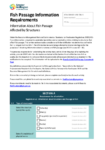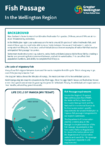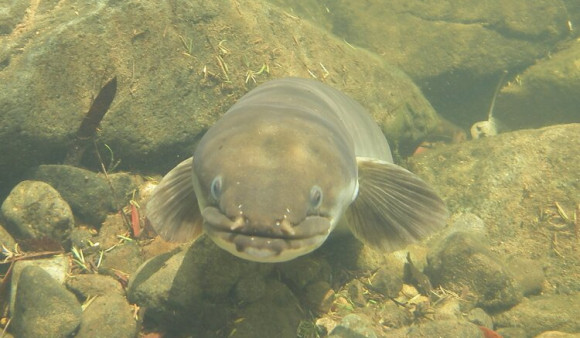Have you ever thought about what could be swimming in your local stream? New Zealand is home to more than 50 native freshwater fish species. Of these, around 70% are threatened or at risk of extinction.
The Wellington region is home to at least 20 species of native fish, which makes our region one of the most diverse for freshwater fish in New Zealand. Many of these fish need to migrate between freshwater rivers and streams and the sea to complete their life-cycle. Tuna (eels) and Inanga (whitebait) are well-known examples of native fish that need unimpeded "fish passage" to survive and reproduce.
How can you help?
Keeping informed is one of the best things you can do to help. For more information, please head to the DOC Fish Passage Management information hub.
It is important to ensure any new structures allow for fish passage.
The NES-F came into effect on 3 September 2020, and includes specific regulations for structures which may affect fish passage.
General information for any activity which involves the placement, alteration, extension, or reconstruction of any of the following structures in, on, over, or under the bed of any river or connected area must be provided to Greater Wellington within 20 working days of the structure’s completion. Structures include:
- Culverts
- Weirs
- Flap gates (whether passive or non-passive)
- Dams
- Fords
- Aprons
- Ramps
Regulations 62-68 of the NES-F specifies the general information requirements for these structures; this includes providing the same passage of fish upstream and downstream as would have existing without the structure, and certain design standards.
If the activity cannot comply with the permitted regulations (regs. 70-74), a resource consent will be required as a discretionary (culverts and weirs) or non-complying activity (passive flap gates). Monitoring and maintenance conditions shall be imposed on these resource consent decisions (in accordance with regs. 71 and 73).
Information can be supplied to Greater Wellington through the NZ Fish Passage Assessment Tool (referencing the record number). If you are unable to use this app, the following form can be used:
Fish Passage Information Requirements

Under the Resource Management National Environmental Standards for Freshwater Regulations 2020 (NESF) a written notice is required to undertake permitted and consented activities relating to structures that affect fish passage.… Read more here

date_range Published 17 Jun 2022
Download now (PDF 1.7 MB) get_appThe NES-F fish passage regulations do not apply to structures that were installed prior to 3 September 2020 or customary weirs used for the purposes of practising tikanga Māori, including customary fishing practices.
If you have an existing structure that may require fish passage remediation or are seeking to install a new instream structure to allow for fish passage a resource consent may be required.
You can also contact us for fish passage advice or if you would like to notify us of instream structures on your property.
More information
The Department of Conservation Fish Passage Management information hub
The NZ fish passage assessment tool and map
Ministry for the Environment Fish Passage fact sheet
Fish passage in the Wellington Region

New Zealand is home to more than 50 native freshwater fish species. Of these, around 70% are at risk of, or threatened by, extinction.
In the Wellington region, our waterways are…
Read more here

date_range Published 24 Jun 2021
Download now (PDF 1.7 MB) get_appGet in touch
- Phone:
- 0800496734
- Email:
- info@gw.govt.nz

